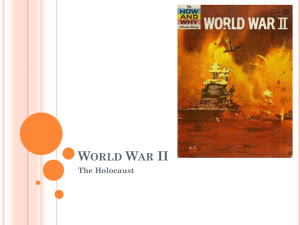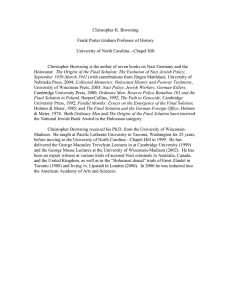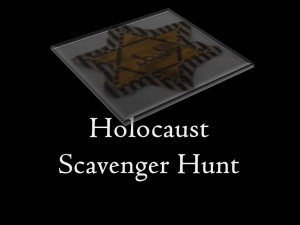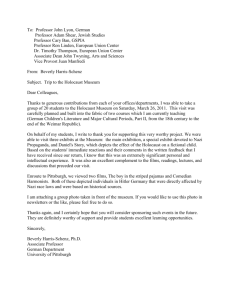GE433: Germany and the Holocaust: Interpretations and Debates Tutor: Christine Achinger Aims:
advertisement
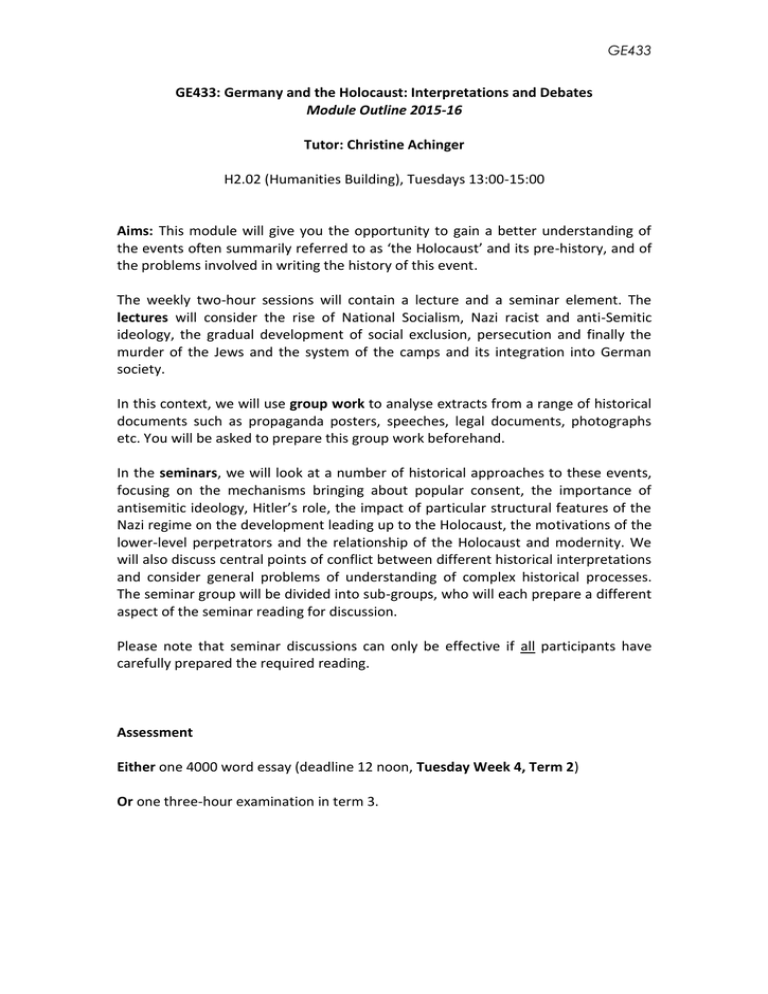
GE433 GE433: Germany and the Holocaust: Interpretations and Debates Module Outline 2015-16 Tutor: Christine Achinger H2.02 (Humanities Building), Tuesdays 13:00-15:00 Aims: This module will give you the opportunity to gain a better understanding of the events often summarily referred to as ‘the Holocaust’ and its pre-history, and of the problems involved in writing the history of this event. The weekly two-hour sessions will contain a lecture and a seminar element. The lectures will consider the rise of National Socialism, Nazi racist and anti-Semitic ideology, the gradual development of social exclusion, persecution and finally the murder of the Jews and the system of the camps and its integration into German society. In this context, we will use group work to analyse extracts from a range of historical documents such as propaganda posters, speeches, legal documents, photographs etc. You will be asked to prepare this group work beforehand. In the seminars, we will look at a number of historical approaches to these events, focusing on the mechanisms bringing about popular consent, the importance of antisemitic ideology, Hitler’s role, the impact of particular structural features of the Nazi regime on the development leading up to the Holocaust, the motivations of the lower-level perpetrators and the relationship of the Holocaust and modernity. We will also discuss central points of conflict between different historical interpretations and consider general problems of understanding of complex historical processes. The seminar group will be divided into sub-groups, who will each prepare a different aspect of the seminar reading for discussion. Please note that seminar discussions can only be effective if all participants have carefully prepared the required reading. Assessment Either one 4000 word essay (deadline 12 noon, Tuesday Week 4, Term 2) Or one three-hour examination in term 3. GE433 WEEK BY WEEK SCHEDULE * = Seminar text - required reading Week 1: Introductory session Lecture: Anti-Semitism before 1933 Week 2: Lecture: The end of Weimar and the rise of National Socialism Seminar: The ideological roots of Nazi racism and anti-Semitism *Michael Burleigh, Wolfgang Wippermann, “Barbarous Utopias: Racial Ideologies in Germany”, in The Racial State, Cambridge: Cambridge University Press, 1991 Recommended: Detlev Peukert, “The genesis of the ‘Final Solution’ from the Spirit of Science”, in Thomas Childers and Jane Caplan, Reevaluating the Third Reich, New York, London: Holmes and Meier, 1993: 234-252. Zygmunt Bauman, Modernity and the Holocaust, Cambridge: Polity: pp. 6272. Week 3: Lecture: The pre-war years 1933-39 . Seminar: Social history – Sources of consent in the German population *Detlev Peukert, “Führermythos und Alltagskonsens” and following chapter, in Volksgenossen und Gemeinschaftsfremde: Anpassung, Ausmerze und Aufbegehren unter dem Nationalsozialismus, Köln: Bund-Verlag, 1982. Recommended: Ian Kershaw, Popular Opinion and Political Dissent in the Third Reich (1984) Robert Gellately, Backing Hitler: Consent and Coercion in Nazi Germany (2001) GE433 Week 4: Lecture: Nazi population policy and Euthanasia Seminar: Hitler’s role: ‘Intentionalism’ *Eberhard Jäckel: ch. 3 + 4 (extracts), in Hitlers Weltanschauung: Entwurf einer Herrschaft, München: DVA, 1981 Recommended: Ian Kershaw, The Nazi Dictatorship, chapters 4-6, London: Arnold, 2000. Omer Bartov, “Antisemitism, the Holocaust, and Reinterpretations of National Socialism”, in Michael Berenbaum and Abraham J. Peck, The Holocaust and History, Bloomington: Indiana University Press: 75-98. Week 5: Lecture: ‘War of extermination’ in the East; Wannsee conference; SS and other main agents Seminar: Hitler’s role: ‘Structuralism/Functionalism’ *Martin Broszat: “Hitler und die Genesis der ‘Endlösung’: Aus Anlaß der Thesen von David Irving”, in Vierteljahrshefte für Zeitgeschichte, no. 4 (Oct. 1977). (extracts) Recommended: Christopher Browning, “Beyond ‘Intentionalism’ and ‘Functionalism’: a Reassessment of Nazi Jewish Policy from 1939 to 1941”, in Thomas Childers and Jane Caplan, Reevaluating the Third Reich, NY, London: Holmes & Meier, 1993: 211-233. Week 6: Reading week Week 7: Lecture: The system of the camps; life and death in an ‘Arbeitslager’ (example Neuengamme); profit and extermination. Seminar: The perpetrators: ‘Ordinary men’ or ‘Hitler’s willing executioners’? * Daniel J. Goldhagen: Introduction and ch. 1, Hitler’s willing executioners: Ordinary Germans and the Holocaust, New York: Knopf, 1997 GE433 Recommended: Daniel J. Goldhagen, Hitler’s willing Executioners: Ordinary Germans and the Holocaust, New York 1996, ch. 1, 3, 15-16 Ian Kershaw, The Nazi Dictatorship: Problems & Perspectives of Interpretation (4th edition), London: Arnold, 2000, 251-262 Geoff Eley (ed.), The "Goldhagen effect": history, memory, Nazism--facing the German past. Ann Arbor : University of Michigan Press, 2000, ch. 1-3. Johannes Heil, Rainer Erb (eds.), Geschichtswissenschaft und Öffentlichkeit: der Streit um Daniel J. Goldhagen, Frankfurt am Main: Fischer Taschenbuch Verlag, 1998 (various chapters) Julius H, Schoeps (ed.), Ein Volk von Mördern? : die Dokumentation zur Goldhagen-Kontroverse um die Rolle der Deutschen im Holocaust, Hamburg: Hoffmann und Campe, 1996 (various chapters) Week 8: Lecture: Genocide: the example Auschwitz. Seminar: The perpetrators: ‘Ordinary men’ or ‘Hitler’s willing executioners’? *Christopher Browning, “One Day in Jozefow: Initiation to Mass Murder”, in Peter Hayes (ed.), Lessons and Legacies: The meaning of the Holocaust in a changing world, Evanston/Ill.: Northwestern University Press, 1991 *Christopher Browning, “Ordinary Germans or Ordinary Men? Another look at the perpetrators”, in Donald G. Schilling (ed.), Lessons and Legacies: Teaching the Holocaust in a changing world, Evanston/Ill.: Northwestern University Press, 1998 Recommended: Daniel J. Goldhagen, Hitler’s willing Executioners: Ordinary Germans and the Holocaust, New York 1996, ch. 6-9 (on police battalion 101) Daniel J. Goldhagen, “Ordinary Men or Ordinary Germans?”, Berenbaum and Peck (eds.) The Holocaust and History, Bloomington: Indiana University Press: 301-307 Christopher Browning, “Die Debatte über die Täter des Holocaust”, in Ulrich Herbert (ed.) Nationalsozialistische Vernichtungspolitik 1939-45: Neue Forschungen und Kontroversen, Frankfurt/M.: Fischer: 148-65 Christopher Browning, Ordinary Men: Reserve Police Battalion 101 and the final solution in Poland, London: Penguin, 2001 (first published 1992) GE433 Week 9: Lecture: Film (extracts from Claude Lanzmann’s Shoah) Seminar: Discussion of issues raised by the film *Dan Diner: “Historical Experience and Cognition: Juxtaposing Perspectives on National Socialism”, in: Beyond the Conceivable: Studies on Germany, Nazism, and the Holocaust, Berkeley, Los Angeles: University of California Press, 2000: 160-170. Week 10: Lecture: The aftermath. Seminar: National Socialism modernity’? ‘relapse into barbarity’ or ‘the dark side of *Zygmunt Bauman, Modernity and the Holocaust, 1989, chapter 1 LITERATURE Further optional reading for each week’s seminar topic will be specified in class. ADDITIONAL REQUIRED READING Primo Levi, If this is a man (several different editions, also as Survival in Auschwitz; I recommend the Simon & Shuster edition) STRONGLY RECOMMENDED Saul Friedländer, Nazi Germany and the Jews, 1933-1945 (abridged edition), New York: Harper Perennial, 2009, 512 pp. (Alternatively, you could read the shorter overview by Wolfgang Benz, Der Holocaust, München: C.H. Beck, 2008, 126 S. - in my view, though, this is not as rich and thoughtful as Friedländer. If you use this book, please use the original GERMAN version, not least because the English translation contains some factual errors!) GE433 Recommended additional / background reading Survivor memories: Jean Améry, At the mind's limits: Contemplations by a survivor on Auschwitz and its realities, Bloomington: Indiana University Press, 1980. Charlotte Delbo, Auschwitz and after, New Haven; London: Yale University Press, 1995. Saul Friedländer, When memory comes, New York: Farrar Straus Giroux, 1979. Roman Frister, The cap: the price of a life, New York: Grove Press, 1999. Ruth Klüger, Still alive: A Holocaust girlhood remembered, New York: Feminist Press at the City University of New York, 2001. Fred Wander, The seventh well (trans. Michael Hofmann), New York: W.W. Norton & Co., 2008. History and pre-history of National Socialism in general Pierre Ayçoberry, The Social History of the Third Reich, 1933-1945, New York: The New Press, 1999. Martin Broszat und Norbert Frei (ed.) Das Dritte Reich im Überblick: Chronik, Ereignisse, Zusammenhänge; in Verbindung mit Wolfgang Benz [et al.]. München: Piper, 1999. Michael Burleigh and Wolfgang Wippermann, The Racial State: Germany 1933-1945, Cambridge: Cambridge University Press, 1991. Michael Burleigh, The Third Reich: A New History, New York: Hill and Wang, 2000. David F. Crew, ed., Nazism and German Society, 1933-1945, London; New York: Routledge, 1994. Norbert Frei, National socialist rule in Germany: The Führer State 1933 -1945 (trans. Simon B. Steyne), Oxford, UK: Cambridge, Mass.: Blackwell, 1993. Peter Fritzsche, Rehearsals for Fascism: Populism and Political Mobilization in Weimar Germany, New York: Oxford University Press, 1990. Peter Fritzsche, Germans into Nazis, Cambridge, Mass.: Harvard University Press, 1998. Robert Gellately, Backing Hitler: Consent and Coercion in Nazi Germany, Oxford: Oxford University Press, 2001. Eric A. Johnson, Nazi Terror: The Gestapo, Jews, and Ordinary Germans, New York: Basic Books, 1999. Ian Kershaw, Weimar: Why did German democracy fail?, London: Weidenfeld and Nicolson, 1990. Ian Kershaw, Hitler, 1936-45: Nemesis, New York: W. W. Norton & Company, 2000. GE433 Ian Kershaw, Popular Opinion and Political Dissent in the Third Reich, Bavaria 19331945, Oxford; New York: Clarendon Press; Oxford University Press, 1983. H.W. Koch (ed.), Aspects of the Third Reich, New York: St. Martin's Press, 1985. Christian Leitz, The Third Reich: The essential readings, Oxford, UK; Malden, Mass.: Blackwell Publishers, 1999. Hans Mommsen (ed.) The Third Reich Between Vision and Reality: New Perspectives on German History 1918-1945, Oxford; New York: Berg, 2001. Detlev Peukert, Inside Nazi Germany: Conformity, Opposition and Racism in Everyday Life (trans. Richard Deveson), New Haven : Yale University Press, 1987. Development of Nazi Antisemitism and the Holocaust Max Horkheimer and Theodor W. Adorno, Dialectic of enlightenment: philosophical fragments (trans. Edmund Jephcott), Stanford, CA: Stanford University Press, 2002 [1944 / 1947]. Hannah Arendt, The origins of totalitarianism, New York: Schocken Books, 2004 [1951]. David Bankier, ed., Probing the Depths of German Antisemitism: German Society and the Persecution of the Jews, 1933-1941, New York: Berghahn Books, 2000. David Bankier, The Germans and the Final Solution: Public opinion under Nazism, Oxford: Blackwell, 1992. Omer Bartov (ed.), Holocaust: Origins, implementation, aftermath. London : Routledge, 2000. Alex Bein, The Jewish question: Biography of a world problem (trans. Harry Zohn), Rutherford, N.J.: Fairleigh Dickinson University Press, 1990. Christopher Browning, The Path to Genocide: Essays on Launching the Final Solution, Cambridge; New York: Cambridge University Press, 1992. David Cesarani, ed., The Final Solution: Origins and Implementation, London; New York: Routledge, 1994. Saul Friedländer, Nazi Germany and the Jews, vol. 1: The years of persecution, New York: Harper Collins, 1997; vol. 2: The Years of Extermination, New York: Harper Collins, 2007 [original full-length version of Friedländer 2009, above]. Robert Gellately, Backing Hitler: Consent and Coercion in Nazi Germany, Oxford; New York: Oxford University Press, 2001. Simone Gigliotti and Berel Lang (eds.), The Holocaust: a reader, Malden, MA : Blackwell, 2005. Martin Gilbert, Atlas of the Holocaust, Oxford; New York: Pergamon Press, 1988. Ulrich Herbert (ed.) National-Socialist extermination policies: contemporary German perspectives and controversies. New York : Berghahn Books, 1999. Raul Hilberg, The Destruction of the European Jews (3rd ed.), New Haven: Yale University Press, 2003. Steve Hochstadt (ed.), Sources of the Holocaust, Basingstoke (UK); New York: Palgrave Macmillan, 2004. GE433 Longerich, Peter. Politik der Vernichtung : eine Gesamtdarstellung der nationalsozialistischen Judenverfolgung. München : Piper, c1998. Peter Longerich, Holocaust: The Nazi persecution and murder of the Jews, Oxford: Oxford University Press, 2010. George L. Mosse, The crisis of German ideology: Intellectual origins of the Third Reich, New York: Grosset & Dunlap, 1964. Moishe Postone, “Anti-Semitism and National Socialism”, New German Critique, No. 19, Winter 1980. Peter Pulzer, The rise of political anti-semitism in Germany & Austria, Cambridge, Mass.: Harvard University Press, 1988. Jean-Paul Sartre, Anti-Semite and Jew (trans. George J. Becker), New York: Schocken Books, 1995 [1947]. Henning Tewes and Jonathan Wright (eds.) Liberalism, anti-semitism, and democracy : essays in honour of Peter Pulzer, Oxford; New York: Oxford University Press, 2001. Enzo Traverso, Understanding the Nazi genocide: Marxism after Auschwitz, London; Sterling, Va.: Pluto Press, 1999. Shulamit Volkov, Germans, Jews, and antisemites: Trials in emancipation, New York: Cambridge University Press, 2006. Robert S. Wistrich, Antisemitism: the longest hatred, New York: Pantheon Books, 1991. Historiography of National Socialism and debates about representation Omer Bartov, Murder in our midst: the Holocaust, industrial killing, and representation, Oxford University Press, 1996. Omer Bartov, Mirrors of Destruction: War, genocide and modern identity, Oxford University Press, 2000. Yehuda Bauer, Rethinking the Holocaust, New Haven; London: Yale University Press, 2001. Yehuda Bauer, The Holocaust as historical experience, New York; London: Holmes & Meier, 2001. Michael Berenbaum and Abraham J. Peck, eds., The Holocaust and History, Bloomington, IN: Indiana University Press, 1998. Michael Burleigh (ed.) Confronting the Nazi past: new debates on modern German history. London: Collins & Brown, 1996. Thomas Childers and Jane Caplan, Reevaluating the Third Reich, New York: Holmes & Meier, 1993. Saul Friedländer (ed.), Probing the Limits of Representation, Cambridge, MA; London: Harvard University Press, 1992. Ian Kershaw, The Nazi Dictatorship: Problems & Perspectives of Interpretation (4th ed.), London: Arnold, 2000. GE433 Walter Laqueur (ed.), Fascism - a reader's guide: analyses, interpretations, bibliography, Berkeley: University of California Press, 1976. Michael Marrus, The Holocaust in History, Harmondsworth: Penguin, 1989. Dan Michman (ed.), Remembering the Holocaust in Germany, 1945-2000: German strategies and Jewish responses, New York: P. Lang, 2002. Bill Niven, Facing the Nazi past: United Germany and the legacy of the Third Reich, London; New York: Routledge, 2002. Dan Stone, The Holocaust and Historical Methodology, New York: Berghahn Books, 2012. Dan Stone (ed.), The Holocaust, Fascism, and memory: essays in the history of ideas, Houndmills, Basingstoke, Hampshire: Palgrave Macmillan, 2013. Debates Intentionalism vs. functionalism Klaus Hildebrand, The foreign policy of the Third Reich, Berkeley: University of California Press, 1973 [1971]. Eberhard Jäckel, Hitler’s World View: A Blueprint for Power, Cambridge, MA; London: Harvard University Press, 1981 [1969]. Hans Mommsen, From Weimar to Auschwitz: Essays in German history (trans. Philip O'Connor), Cambridge: Polity, 1991. Lucy S. Dawidowicz, The War Against the Jews, 1933-1945, New York: Holt, Rinehart and Winston, 1976. Historians’ Dispute Peter Baldwin (ed.), Reworking the past: Hitler, the Holocaust, and the historians' debate, Boston: Beacon Press, 1990. Peter Pulzer, “Erasing the Past: German Historians debate the Holocaust”, Patterns of Prejudice 21:3 (1987). Steven Aschheim, “History, Politics, and National Memory: The German Historikerstreit”, in Survey of Jewish Affairs 1988, Associated University Presses, 1989. ‘Ordinary Germans’ or ‘ordinary men’? Christopher R. Browning, Ordinary men : Reserve Police Battalion 101 and the final solution in Poland, New York : HarperCollins, 1992 GE433 Geoff Eley (ed.), The "Goldhagen effect": History, memory, Nazism – facing the German past, Ann Arbor: University of Michigan Press, 2000. Norman G. Finkelstein and Ruth Bettina Birn,A nation on trial : the Goldhagen thesis and historical truth, New York : Metropolitan Books, 1998. Daniel Jonah Goldhagen, Hitler’s Willing Executioners: Ordinary Germans and the Holocaust, New York: Vintage Books, 1996. Fred Kautz, The German historians: Hitler's willing executioners and Daniel Goldhagen, Montréal, London: Black Rose, 2003. Julius H. Schoeps (ed.), Ein Volk von Mördern? : die Dokumentation zur GoldhagenKontroverse um die Rolle der Deutschen im Holocaust, Hamburg: Hoffmann und Campe, 1996. Robert R. Shandley (ed.), Unwilling Germans? : The Goldhagen debate, Minneapolis : University of Minnesota Press, 1998. Holocaust and Modernity Zygmunt Bauman, Modernity and the Holocaust, Ithaca, N.Y.: Cornell University Press, 1989. Robert Fine and Charles Turner, eds., Social Theory after the Holocaust, Liverpool: Liverpool University Press, 2000. Detlev Peukert, “The genesis of the ‘Final Solution’ from the Spirit of Science”, in Thomas Childers and Jane Caplan, Reevaluating the Third Reich, New York, London: Holmes and Meier, 1993: 234-252. Steven T. Katz, “The Uniqueness of the Holocaust”, in Alan S. Rosenbaum (ed.), Is the Holocaust unique?: Perspectives on comparative genocide (2nd ed.), Boulder, CO: Westview Press, 2001.
